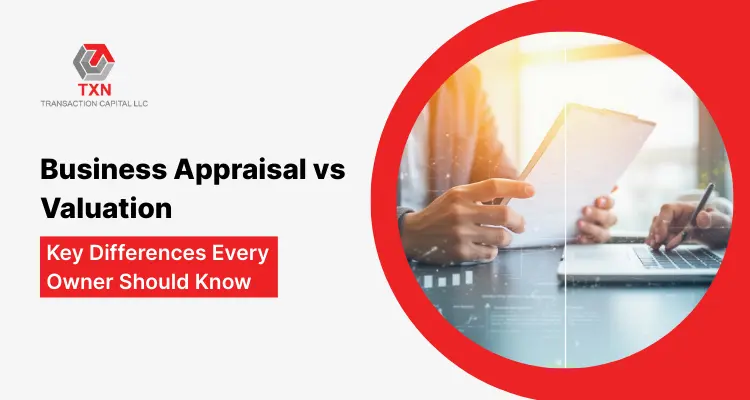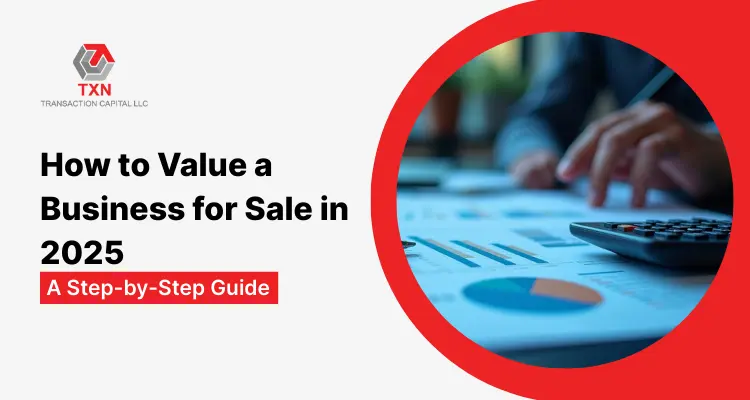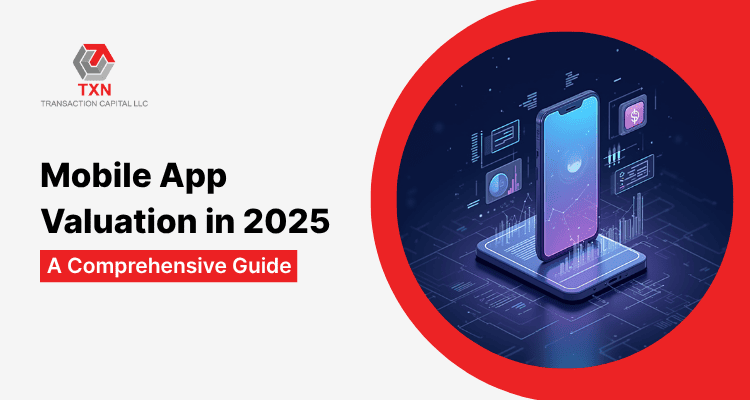How to Conduct a Business Valuation the Right Way: A Certified Expert’s Guide for 2025

Everything you need to know about choosing the right valuation method, adjusting for dilution, and valuing startups with complex structures.
Business valuation extends beyond simply crunching numbers; it includes capturing a company’s true economic potential through organized analysis and professional judgment. At Transaction Capital LLC, we have observed far too many entrepreneurs and investors treating valuation as a quick estimate. In reality, it is a multifaceted process that integrates financial modeling, market analysis, and strategic assumptions.
Whether you are preparing for capital raising, a shareholder exit, tax planning, or an M&A transaction, this guide will help you navigate the steps necessary for a thorough business assessment.
Why is business valuation more than just a calculation?
Many entrepreneurs believe that after delivering a 30-minute speech or presenting a few slides with predictions, they can confidently request a multimillion-dollar valuation. However, the true value of a business is determined by its cash flow potential, risk profile, market dynamics, and ownership structure, not by the ambition of its creator.
Valuation is a negotiation-based on analysis in which different stakeholders — buyers, investors, and tax authorities—arrive at varying valuations based on their objectives and assumptions. This is why the process must be strong, clear, and defensible.
Step 1: Determine the standards and premise of value
The standard of value serves as the cornerstone for every business appraisal. Common standards include:
Fair Market Value (FMV):
Fair Market Value (FMV) is what a willing buyer and seller would agree to if they were not forced to do so.
Investment Value:
Investment value refers to the worth of a specific investment, typically determined by synergies or strategic benefits.
Fair Value (Legal):
Frequently used in minority shareholder disputes and financial reporting.
Intrinsic Value:
The “true” value is derived from fundamentals, regardless of market conditions.
Next, choose the premise of value, which specifies the context:
Going Concern: Assumes the firm will continue to operate regularly.
Liquidation Value: Assumes the sale of assets in a crisis or closure.
Value in Use: The specific utility value of assets in present usage.
Value in exchange: Value realised by selling in the open market.
Step 2: Select the appropriate valuation method
Every business is unique. Choosing the improper method can result in a deceptive appraisal. There are three major categories:
1. Asset Approach
Ideal for: real estate, holding firms, and capital-intensive businesses.
Process: Adjust the net book value to the fair market value.
Drawback: Ignores intangible values such as brand or IP.
2. Market Approach
Ideal for: mature firms with recognised peers.
Process: Use public comparables or previous transactions.
Drawback: Risk of incorrect “apples-to-bananas” comparisons if peers are not actually equivalent.
3. Income Approach
Best for: Growth-stage companies.
Process: Earnings Capitalisation or Discounted Cash Flow (DCF).
Drawback: Requires trustworthy estimates and appropriate risk assessments.
Step 3: Value the intangibles—do not just lump them into goodwill
Intangible assets, such as brand equity, technology, customer relationships, patents, trade secrets, and human capital, are becoming increasingly important to business value. These elements dictate pricing power, retention, and scalability. A thorough valuation should identify and apply relevant models to these intangibles (for example, the Relief-from-Royalty or Multi-Period Excess Earnings Method), especially for tech-enabled or IP-driven enterprises.
Step 4: Address complex capital structures
Modern startups frequently issue instruments such as:
- CCPS (Compulsorily Convertible Preference Share)
- OCPS (Optional Convertible Preference Shares)
- FCCD (fully convertible debentures)
- SAFE Notes (Simple Agreement For Future Equity)
Each has distinct terms, such as liquidation privileges, anti-dilution rights, or participating dividends. A proper valuation distributes enterprise value among these instruments using the Option Pricing Method (OPM) or Probability-Weighted Expected Return Method (PWERM), ensuring a fair distribution of equity value.
Step 5: Consider future dilution
Future dilution from ESOPs, convertible notes, warrants, or pending application funds might significantly impact a founder’s stake. Valuation should always be done on a fully diluted basis, anticipating future ownership landscapes. Ignoring this might lead to overvaluation and investor backlash.
At Transaction Capital LLC, we use cap table modelling to account for the dilution waterfall and predict various future scenarios.
Step 6: Don’t Rely Solely on Multiples – Use Them as a Sanity Check
Valuation multiples (e.g., 3x revenue or 10x EBITDA) serve as useful benchmarks but are not definitive instruments. They can vary significantly depending on industry, geography, growth stage, and investor expectations.
For instance, a SaaS company with 90% gross margins and 120% net revenue retention may warrant a considerably higher sales multiple than a flat-growth services organization. When similar companies are unavailable, apply the Rule of Thumb cautiously, considering business-specific characteristics such as client concentration, recurring revenue, or location advantages.
Special Considerations for 2025
With rising interest rates, fluctuating consumer demand, and higher audit standards, 2025 presents new valuation issues.
- Discount rates (WACC) must include updated capital market assumptions.
- Regulatory scrutiny surrounding 409A valuations has intensified.
- Auditors demand consistent documentation and compliance with AICPA SSVS No. 1 and USPAP.
Transaction Capital LLC integrates these principles throughout all certified valuations.
Final Thoughts: Valuation is the result of informed judgment
A proper valuation takes into account not only where a company stands today but also its potential for growth. It integrates analysis, insight, and professional rigor.
Transaction Capital LLC has performed over 1,500 valuations globally for startups, growth-stage companies, private equity-backed enterprises, and distressed assets. Auditors, investors, tax advisors, and legal teams rely on our reports.
Get a Certified Business Valuation today.
Whether you’re issuing stock options, raising financing, selling your company, or dealing with tax requirements, we’ll help you get it right—with reports written by credentialed professionals (ABV®, ASA, MRICS®, CVA®) and audit-defensible procedures.
Contact Transaction Capital LLC for a free consultation or quote now.
- Phone +1 (917) 809-4838
- Email: info@txncapitalllc.com
- Website: txncapitalllc.com
- Telegram: saurobhbarick



